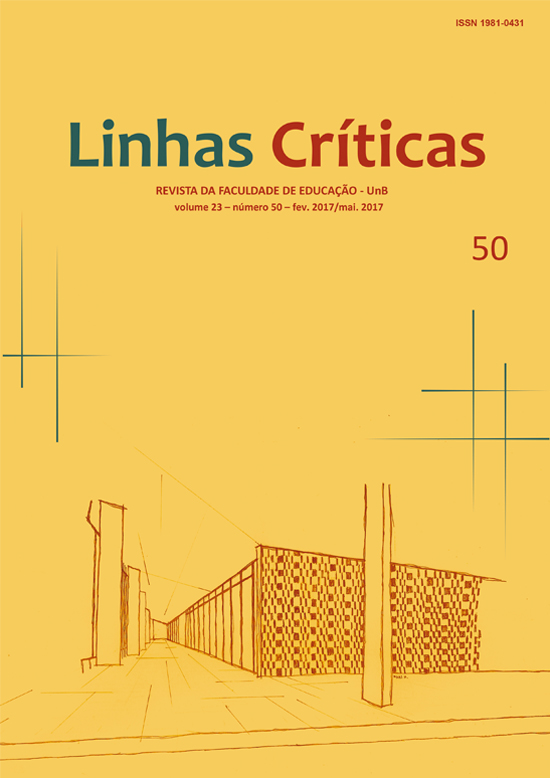Contributions to examine the policies of affirmative action in UFRGS
DOI:
https://doi.org/10.26512/lc.v23i50.5056Keywords:
Affirmative action, Recognition of the cultureAbstract
The article develops the Recognition of Culture category as theoretical framework to analyze the changes produced by affirmative action in Brazilian universities. There were literature review and participant observations UFRGS. The work is based on the notion of habitus of Pierre Bourdieu, in theory recognition of Axel Honneth and Nancy Fraser over production of participatory parity. Can affirmative action promote a culture of recognition at institutions? The conclusions point out that the first steps towards materializing a culture of recognition were taken and, at the same time, proposes a set of actions to develop it in a more comprehensive manner
Downloads
References
BAUMAN, Zigmund. Culture as Praxis. Londres, Sage, 2000.
BOURDIEU, Pierre. O poder simbólico. Rio de Janeiro: Bertrand Brasil, 2001.
______. Lê Sens Pratique. Paris: Minuit, 1980.
______. The Logic of Practice. Stanford, CA: Stanford University Press, 1990.
______. A economia das trocas simbólicas. São Paulo: Perspectiva, 1992.
______. Razões práticas: sobre a teoria da ação. São Paulo: Papirus, 1996.
______. Capital Cultural, Escuela y Espacio Social. México: Siglo Veinteuno, 1997.
CARIA, Telmo. O uso do conceito de cultura na investigação sobre profissões. Análise Social, vol.XLIII(4.º), pp. 749-773, 2008.
CARVALHO, José Jorge. O confinamento racial do mundo acadêmico brasileiro. REVISTA USP, São Paulo, n.68, pp. 88-103, dez/fev 2005-2006.
CHERQUES, Hermano Roberto. Pierre Bourdieu: a teoria na prática. RAP Rio de Janeiro 40(1): 27-55, Jan./Fev. 2006.
CUCHC, Denys. A noção de cultura nas ciências sociais. Bauru: EDUSC, 1999.
EAGLETON, Terry. A Ideia de Cultura. Lisboa, Temas & Debates, 2003.
FERES JÚNIOR, João. Contribuição a uma Tipologia das Formas de Desrespeito: Para Além do Modelo Hegeliano-Republicano. DADOS ”“ Revista de Ciências Sociais, Rio de Janeiro, Vol. 45, nº4, pp. 555 a 576, 2002.
FERNANDES, Florestan. A Integração do Negro na Sociedade de Classes. São Paulo, Cia. Editora Nacional, 1965.
FRASER, Nancy.Da redistribuição ao reconhecimento? Dilemas da justiça na era pós-socialista. Cadernos de campo, São Paulo, n. 14/15, pp. 231-239, 2006.
______. Reconhecimento sem ética? Lua Nova, São Paulo, 70: 213-222, 2007.
FUHRMANN, Nadia Lucia.O primado do Reconhecimento sobre a redistribuição: a origem dos conflitos sociais a partir da teoria de Axel Honneth. Sociologias, Porto Alegre, ano 15, nº 33, mai./ago, pp. 170-203, 2013.
GRATIUS, Susanne; VALENÇA, Marcelo. Violência Urbana em Caracas e no Riode Janeiro: respostas locais e europeias. Madri: FRIDE, 2011.
HONNETH, Axel. Luta por reconhecimento: a gramática moral dos conflitos sociais. Trad. de Luiz Repa. São Paulo: Ed. 34, 2003.
_______. Reconhecimento ou Redistribuição? A mudança de perspectivana ordem moral da sociedade. In: SOUZA, J.; MATTOS, P. (Orgs) Teoria Crítica no Século XXI. São Paulo: Annablume, 2007.
WEBER, Max. A objetividade do conhecimento nas ciências sociais. São Paulo: Ática, 2006.
Downloads
Published
How to Cite
Issue
Section
License
Copyright (c) 2017 Linhas Críticas

This work is licensed under a Creative Commons Attribution 4.0 International License.
Authors who publish in this journal agree to the following terms:
-Authors maintains the copyright and grants the journal the right of first publication, the work being simultaneously licensed under the Creative Commons Attribution License which allows the sharing of the work with recognition of the authorship of the work and initial publication in this journal.
- Authors are authorized to enter into additional contracts separately, for non-exclusive distribution of the version of the work published in this journal (eg publish in institutional repository or as a book chapter), with acknowledgment of authorship and initial publication in this journal.
-Authorers are allowed and encouraged to publish and distribute their work online (eg in institutional repositories or on their personal page) at any point before or during the editorial process, as this can generate productive changes as well as increase the impact and the citation of published work (See The Effect of Free Access).



